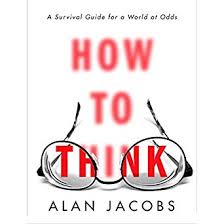And yet, Jacobs admits that these books are in a series, and that they are related, as disparate as they may seem. The careful reader will, indeed, find that there is a connection between them all. Not a connection that requires reading the books in sequence, but that these are markers, perhaps, staking out the boundaries of a mind alive to the unity of the world and its possibilities. The series is by no means complete, so it will not surprise me to find another short book set out to help readers navigate the modern world, published in a few more years.
Jacobs is, by profession, a teacher of literature. He has also done significant work as a cultural critic. In this he is much like C. S. Lewis, a thinker with whom Jacobs has demonstrated significant interest and expertise. It is not difficult, as a result, to find echoes of Lewis throughout Jacobs’ work, especially in this latest book, Breaking Bread with the Dead, which shares a common theme with Lewis’ essay, “On the Reading of Old Books.”
Breaking Bread with the Dead obviously comes out in favor of reading old books. But read in context with The Pleasures of Reading in an Age of Distraction, it is abundantly clear that Jacobs is not advertising the “checklist” approach of slogging through “Greats,” which is a quest to max out your score on Facebook quizzes and a recipe for gobbling a gourmet feast without savoring the marinated centuries between works—in other words, it represents the sin of gluttony. Rather, he is arguing that reading old books is necessary to understand our times and to live in them.
Jacobs clearly states this goal toward the end of his introduction,
To open yourself to the past is to make yourself less vulnerable to the cruelties of descending in tweeted wrath on a young woman whose clothing you disapprove of, or firing an employee because of a tween you didn’t take time to understand, or responding to climate change either by ignoring it or by indulging in impotent rage. You realize that you need to obey the impulses of this moment—which, it is fair to say, never tend to produce a tranquil mind.
This book is an essay that wanders toward a single goal, rather than an argument with chapters neatly divided into segments of support and refutation. It is a literary essay that seeks to deal with the questions of the day. One of the most pertinent questions for our tiny historical moment is whether one dare to read authors whose social and moral views differ—whether greatly or radically—from our own.
Jacobs begins by examining the problem of presentism, which is the tendency to see our particular cultural moment as the moral apex of humanity and to denigrate all who have ever had a differing opinion. Thus, the reading of Robinson Crusoe must be abandoned because it is racist, sexist, colonial, and a bunch of other bad things that are native and irrevocably attached to old, dead, white men. Jacobs argues that in order to properly understand our own moment, we must interact with minds that came before our moment, even when they do, in fact, have racist, sexist, and colonial ideas.
The concept for engaging with those we disagree with is represented as “table fellowship,” which is obviously conveyed by the title of the book. Jacobs understands this has the center of the book: “sitting at the table with our ancestors and learning to know them in their difference from, as well as their likeness to, us.” He argues that reading even those with whom we disagree—by inviting them to our table—we open ourselves up to a greater understanding of their time and ours. But at the same time, since we invite these sometimes-scraggly guests through the practice of reading, we control the interaction, so that when they get to rowdy we can, with little effort, simply disinvite them from the meal by closing the book and moving to another guest.
Breaking bread with the dead offers us challenges to our own worldview—exactly the reason many activist “academics” want them “cancelled”—and force us to examine our unexamined assumptions. They also force us to wrestle with the reality that our morality du jour has some of the same barbarities of a previous age (albeit with a different shade of lipstick) and that it sometimes is a positive logical outcome of a trajectory we might find in older literature, if we but take the time to consider it. Reading old books helps us to understand ourselves and our time better.
As morality has become increasingly unpinned from any sense of permanence or overt morality, the pace of change from one absolute standard to another has become exhausting. A group of racist trolls on a social media site turn the “OK” symbol into a symbol for “white power” and suddenly everyone who uses the symbol, with its long-standing cultural significance, is now complicit in white supremacy. Unless, of course, someone who is of the right color or political affiliation uses it, in which case it means what it has consistently meant. The tyranny of the present undermines every sense of peace. As Jacobs argues, reading old books is the best way to remind ourselves of our own finitude, the temporary nature of our culture’s moral conclusions, and deepens our souls to better understand those who differ from us. In other words, breaking bread with the dead helps make us more human and reminds us of the humanity of others.















There’s no reason to doubt that Jesus was nailed to the cross. Ultimately, I trust what Scripture says about Jesus’s crucifixion because I also trust what it says about his resurrection. And that’s what we should be celebrating this week.